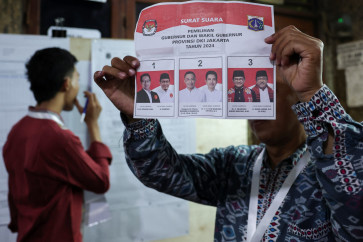Popular Reads
Top Results
Can't find what you're looking for?
View all search resultsPopular Reads
Top Results
Can't find what you're looking for?
View all search resultsAmartha, PrivyID team up for easier digital verification
Peer-to-peer (P2P) lending provider Amartha has announced its collaboration with digital signature provider PrivyID to enable easier identification verification and a more secure digital know your customer (KYC) method
Change text size
Gift Premium Articles
to Anyone
P
eer-to-peer (P2P) lending provider Amartha has announced its collaboration with digital signature provider PrivyID to enable easier identification verification and a more secure digital know your customer (KYC) method.
The collaboration is part of Amartha’s strategy to reach more investors and microentrepreneurs, many of which operate in remote areas.
Amartha vice president Aria Widyanto said many microentrepreneurs were still unbanked and lacked access to funding.
According to the World Bank Global Findex 2017, Indonesia made the most progress in financial inclusion across East Asia and the Pacific with 48.9 percent bank account ownership in 2017 from 36 percent in 2014 and 20 percent in 2011.
However, the latest data also shows that 51 percent of the country’s population do not have a bank account, leaving them at risk of financial illiteracy.
Speaking at a discussion on digital signatures in South Jakarta recently, Aria explained the reasons behind the high percentage of unbanked Indonesians.
“The high percentage is because of location and economic scale, and this is why Amartha aims at giving access to microentrepreneurs in remote areas,” he said.
Aria explained that traditional banks were reluctant to lend money to these entrepreneurs because of the miniscule size of their businesses.
Moreover, he went on, the advancement of technology had created new discrepancies between the banked and unbanked.
Therefore, Amartha is attempting to bridge the gap by guiding entrepreneurs in remote areas to digitally record their data to gain access to funding and scale-up their businesses.
“These people usually rely on offline procedures, but we want everyone to have a digital footprint so that when they need to borrow more money to expand their business, they have accessible records,” Aria added.
The Financial Services Authority (OJK) requires fintech companies to include digital signatures in their procedures as stated in OJK Regulation No. 77/POJK.01/2016 on technology-based lending services.
At the same event, PrivyID cofounder Guritno Adi Saputra explained about the utilization of digital signatures in collaboration with fintech companies like Amartha.
“A digital signature is not just scribbling on tablets; before the signature is taken, data is collected for authentication and each customer must have a distinctive identifier,” he said.
Guritno explained that the digital signature is used in a process called e-KYC. The process begins with the user signing up and requesting a loan from Amartha. PrivyID will then verify the user’s identification and publish their ID signature.
Next, an Amartha staffer and customer will sign a loan agreement. The steps are carried out through an Amartha staffer’s gadget to help those who do not have smartphones.
Digitalization has made lending more efficient, but P2P lending is prone to fraud. As of July, the OJK recorded 227 illegal P2P lending providers operating in the country, compared to 63 licensed ones.
Responding to the cases, Amartha’s Aria insisted that as a licensed fintech company, Amartha always adhered to regulations.
“We strictly obey the OJK’s regulations and we follow the information security management system, all 28 procedures of it, including international security standard ISO/IEC. All prevent the misuse of customer data,” he stated.
Supporting the statement, PrivyID’s Guritno also assured that customer protection was of highest priority amid the fear of signature forgery and data theft. He believed digital signatures help to prevent fraud.
“Every user has a private key, two identification factors, log-in and text verification. Every digital signature is encrypted by the user’s private key,” he said.
According to OJK data, transactions through P2P lending totaled Rp 13.8 trillion (US$951 million) in the first three quarters, with the non-performing loan rate recorded at 1.2 percent.
The data shows that the majority of loans, Rp 11.56 trillion, were taken out in Java. P2P lending transactions have increased drastically this year, with the OJK recording Rp 284 billion in transactions in December 2016 and Rp 2.56 trillion in December 2017. (aak)










